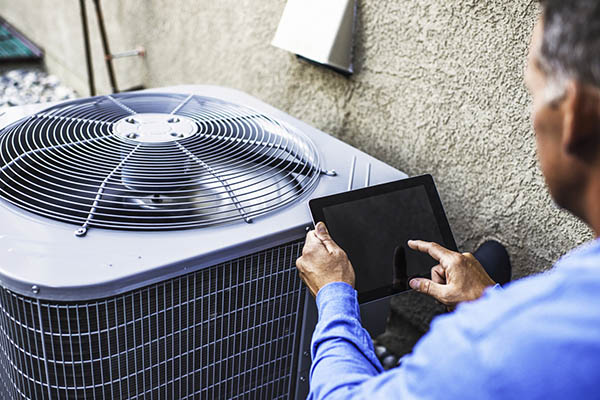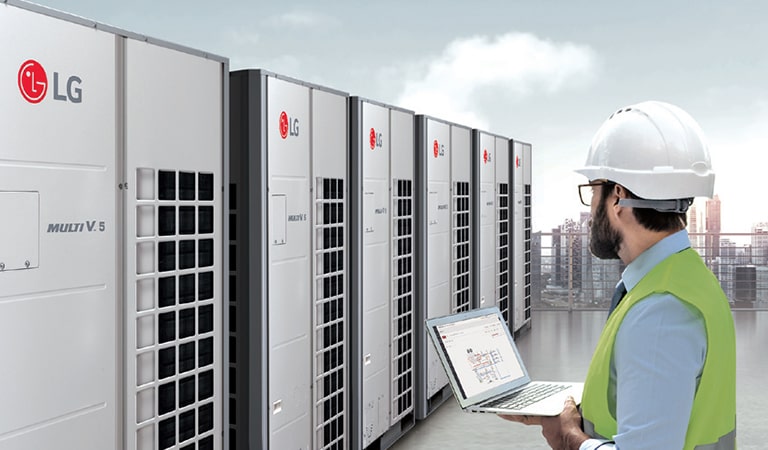A Complete Guide to Installing ductless mini splits in Any Climate
A Complete Guide to Installing ductless mini splits in Any Climate
Blog Article
Selecting In Between a Warmth Pump and Heater: Secret Considerations for Your A/c Demands
When examining heating choices for heating and cooling needs, the choice in between a heat pump and a furnace can be complex. Each system provides distinct advantages customized to details climates and energy performance goals. Understanding these differences is important for making an informed selection. Trick aspects such as setup prices and environmental effect further complicate the selection procedure. Which option absolutely lines up with one's convenience and sustainability preferences? The following sections will certainly check out these factors to consider carefully.
Understanding Warm Pumps: How They Function and Their Benefits
While lots of property owners take into consideration different home heating options, recognizing how warm pumps function and their benefits can greatly influence their choice. Heat pumps run by moving heat as opposed to generating it. In the winter season, they remove warm from the outside air or ground and move it indoors, while in the summertime, they reverse this process, cooling down the home by expelling warm outside. This double capability makes them versatile for year-round climate control.One of the primary benefits of warm pumps is their power efficiency. They make use of considerably less electrical power contrasted to traditional heater, potentially leading to reduced energy expenses (ductless mini splits). Furthermore, heatpump have a smaller sized carbon footprint, making them an ecologically pleasant selection. They additionally require less maintenance than traditional systems, adding to lasting price financial savings. Overall, comprehending the technicians and benefits of heatpump can aid house owners make educated decisions concerning their home heating and cooling down needs
Exploring Heating Systems: Kinds, Operation, and Advantages
Furnaces can be found in numerous kinds, consisting of gas, electric, and oil designs, each with unique operational mechanisms. Recognizing these differences is necessary, as they affect effectiveness and home heating efficiency. Furthermore, furnaces offer many benefits, such as consistent heat result and reliability in cooler climates.
Sorts of Heaters
Heating unit can differ substantially in layout and operation, with furnaces being a popular choice amongst house owners. There are several kinds of heating systems, each utilizing various gas sources and technologies. Gas heating systems prevail, leveraging gas to produce warm successfully. Electric heaters, on the various other hand, utilize electrical resistance to produce warmth, usually favored for their uncomplicated setup. Oil furnaces, while less typical, are efficient in areas with limited gas accessibility (heat pump installation ooltewah tn). Additionally, condensing heating systems make the most of power performance by capturing and recycling exhaust gases. Each type runs through a system of warm exchangers and ductwork to distribute cozy air throughout a home. Recognizing the differences in between these heater kinds is vital for educated a/c choices
Advantages of Heating systems
For home owners seeking dependable warmth throughout chilly months, the benefits of heaters are significant. Heating systems supply constant heating, ensuring even temperature levels throughout the home. They are specifically reliable in extreme cold, commonly outmatching heat pumps in icy problems. Various types, including gas, electric, and oil heating systems, provide versatility to satisfy varied requirements and preferences.Furnaces likewise tend to have reduced first installment prices contrasted to heatpump, making them an extra obtainable alternative for many. Their durable layout adds to a much longer life expectancy, with lots of units lasting over 15 years with proper maintenance. Additionally, modern heaters are frequently geared up with advanced technology for improved performance, which can bring about lowered power expenses. Overall, furnaces continue to be a reputable selection for effective home heating.

Power Effectiveness: Comparing Heat Pumps and Furnaces
When contrasting energy performance in between heatpump and furnaces, the Seasonal Energy Performance Ratio (SEER) plays an important function in figuring out performance. Additionally, a functional cost evaluation discloses the long-term monetary effects of each system. Understanding these elements can guide house owners in making informed decisions about their heating remedies.
Seasonal Power Efficiency Ratio
Energy effectiveness plays a crucial duty in the decision-making procedure between heatpump and heating systems, particularly when considering the Seasonal Power Efficiency Ratio (SEER) This statistics steps the cooling effectiveness of heatpump over a whole air conditioning period, supplying a standard method to assess efficiency. Greater SEER scores show better energy effectiveness, converting to reduced energy consumption and lowered utility expenses. On the other hand, heating systems are typically evaluated utilizing the Annual Fuel Application Performance (AFUE) score, which mirrors home heating performance. When comparing these 2 systems, home owners ought to focus on SEER ratings for heatpump, as they directly influence overall power financial savings and ecological sustainability. A thorough understanding of SEER can notably affect the lasting contentment and cost-effectiveness of the chosen a/c option.
Functional Expense Analysis
Comprehending the operational prices connected with warmth pumps and heating systems is crucial for home owners examining their choices. Heat pumps generally provide greater energy performance, transforming electric energy into warmth with click for more info marginal waste. This leads to reduced month-to-month energy bills, particularly in moderate environments. On the other hand, traditional heating systems, especially gas designs, may have reduced upfront costs but can incur higher functional costs in time due to sustain rates and performance ratings.Moreover, warmth pumps can work as both home heating and cooling down systems, possibly decreasing the demand for separate cooling and heating units. While preliminary financial investments for heat pumps may be greater, their long-lasting savings in energy effectiveness can make them a more economical option for several households. Careful evaluation of neighborhood energy rates is essential to identify the most effective option.
Installment Expenses: What to Anticipate for every Furnace
Installation prices for furnace can vary significantly between heatpump and furnaces, influencing property owners' decisions. Warm pumps usually have higher in advance setup prices, commonly ranging from $3,500 to $8,000, depending on the system size and intricacy of setup. This includes the outdoor system, interior handling system, and needed ductwork modifications. Conversely, heaters often tend to have reduced preliminary costs, averaging in between $2,500 and $6,000, which can be appealing for budget-conscious home owners. However, installation expenditures can boost if considerable ductwork is required.Moreover, the selection of gas kind for heating systems-- gas, propane, or electrical-- can likewise impact installation costs. While heat pumps supply power efficiency, their preliminary financial investment might prevent some customers. Ultimately, examining installment prices alongside long-lasting savings and effectiveness will help house owners in making informed choices concerning their furnace.
Climate Considerations: Which System Carries Out Much Better in Your Location
Just how do environment conditions influence the performance of furnace? The performance of warmth pumps and furnaces can vary substantially relying on the local climate. In moderate climates, warmth pumps excel by successfully transferring warmth from the outdoors air, making them an energy-saving choice. However, their efficiency diminishes in exceptionally chilly temperature levels, where they may struggle to draw out sufficient warmth. Alternatively, furnaces, specifically gas designs, supply dependable and constant warm no matter outdoor conditions, making them more effective in chillier regions.In areas that experience milder winters months, warm pumps can run properly year-round, giving both heating & cooling. On the other hand, areas with extreme winters months commonly benefit from the toughness of furnaces. Eventually, understanding the local environment is crucial when determining in between a heatpump and a heater, as it directly influences their functional effectiveness and general efficiency.
Upkeep Demands: Long-Term Take Care Of Warmth Pumps vs. Furnaces
While both heatpump and furnaces call read the full info here for routine upkeep to assure peak efficiency, their certain demands and treatment routines vary substantially. Heaters generally need much less regular interest, with yearly evaluations being enough to look for gas leakages, clean filters, and evaluate total capability. Their simpler design commonly enables simple repairs.In contrast, heatpump demand biannual upkeep because of their double function in cooling and heating. This includes cleaning coils, examining refrigerant levels, and guaranteeing that both the interior and outside devices operate at their ideal. Furthermore, warm pump upkeep usually involves even more elaborate components, making professional maintenance essential.Neglecting maintenance can bring about lessened efficiency and enhanced energy costs for both systems. Ultimately, property owners ought to think about these lasting treatment demands when selecting between a heatpump and a furnace, as positive upkeep can extend the lifespan and efficiency of either system substantially.
Ecological Effect: Selecting a Sustainable Heating Alternative
The ecological effect of heating unit is a vital evaluation for property owners seeking lasting options. Heatpump are typically much more energy-efficient than conventional heaters, as they move warm rather than create it, significantly minimizing carbon exhausts. By using renewable resource sources, such as air-source or geothermal heatpump, property owners can additionally decrease their ecological footprint.On the various other hand, natural gas furnaces go to my site release greenhouse gases and add to air pollution, though they typically offer greater warmth outcome. Improvements in modern technology have led to the growth of high-efficiency furnaces that lessen emissions.Ultimately, picking a home heating system involves weighing effectiveness against environmental impact. Property owners are encouraged to mirror on local power sources and motivations for renewable systems, ensuring a choice that lines up with both personal comfort and ecological duty. The decision influences not only prompt comfort yet likewise long-lasting sustainability and ecological wellness.
Often Asked Concerns
Exactly How Lengthy Do Heat Pumps and Furnaces Usually Last?
The life-span of warmth pumps normally varies from 15 to twenty years, while heaters can last in between 15 to three decades. Routine maintenance significantly influences their longevity and efficiency in supplying home heating services.
Can I Make Use Of a Heatpump in Incredibly Cold Climates?
Heatpump can operate in very chilly climates, however their efficiency reduces as temperatures decrease. In such conditions, supplementary heating sources may be needed to keep comfortable interior temperatures and guarantee peak performance.

What Is the Sound Degree of Warm Pumps Versus Furnaces?
The sound levels of warmth pumps and heaters vary significantly. Normally, warmth pumps run even more silently than traditional heaters, making them more effective for those delicate to seem, while heating systems might generate louder functional sounds throughout home heating cycles.
Are Warmth Pumps Suitable for Both Cooling And Heating?
Heatpump are undoubtedly appropriate for both heating and air conditioning (heat pump installation ooltewah tn). They work by transferring heat, giving efficient temperature level control year-round, making them a versatile selection for homeowners seeking an all-in-one a/c service
What Dimension Heating Unit Do I Need for My Home?
Determining the proper size heating unit for a home requires reviewing elements such as square video, insulation top quality, neighborhood environment, and the home's format. Consulting a professional can ensure a precise evaluation and optimal comfort. Warm pumps generally supply higher power performance, converting electrical energy into warm with very little waste. In modest climates, warmth pumps excel by effectively transferring heat from the outdoors air, making them an energy-saving alternative. On the other hand, heating systems, particularly gas models, offer constant and trustworthy heat no matter of exterior conditions, making them more effective in cooler regions.In locations that experience milder winter seasons, warm pumps can operate successfully year-round, offering both home heating and air conditioning. Warm pumps are typically extra energy-efficient than standard heaters, as they move warm instead than create it, considerably lowering carbon exhausts. By making use of sustainable power resources, such as air-source or geothermal warmth pumps, house owners can further lessen their eco-friendly footprint.On the other hand, all-natural gas furnaces discharge greenhouse gases and add to air contamination, though they frequently offer greater warm outcome.
Report this page